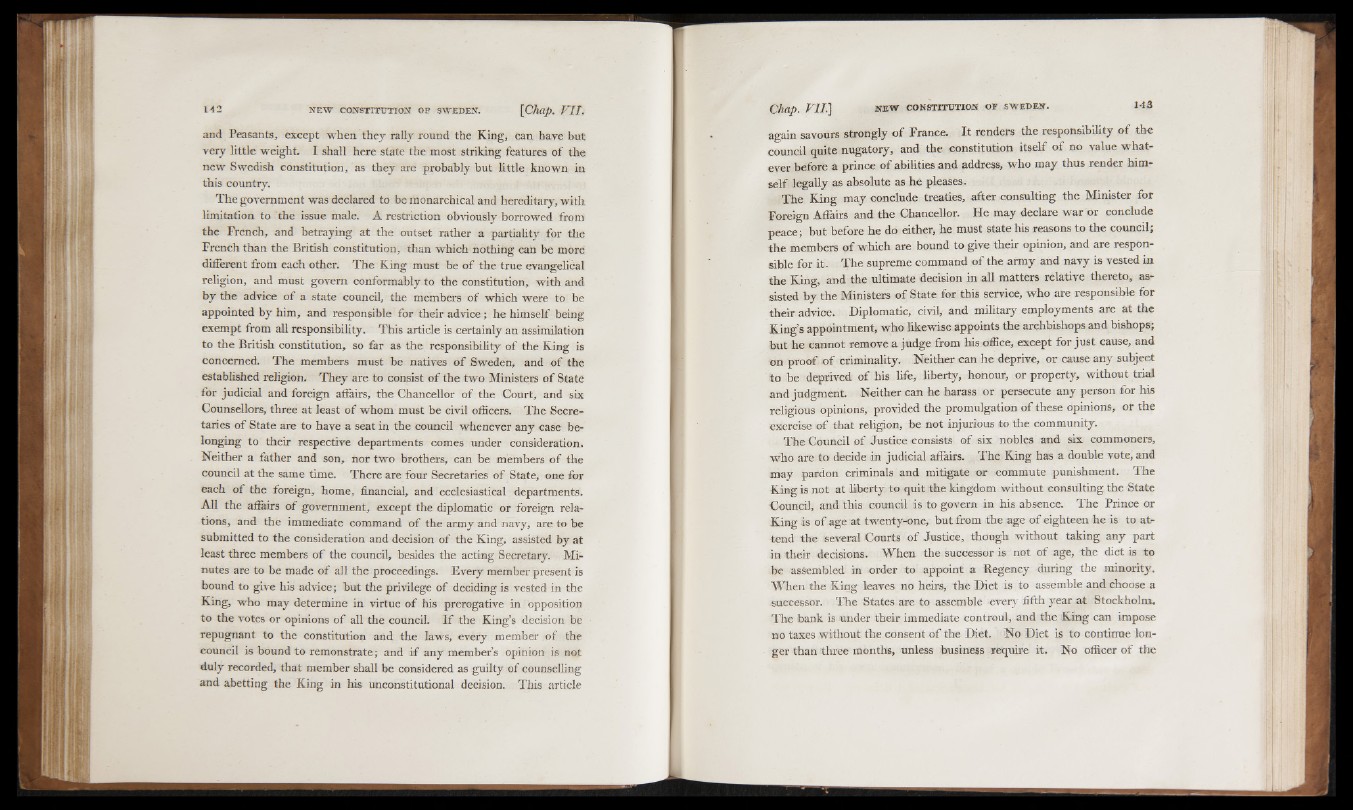
and Peasants, except when they rally round the King, can have but
very little weight. I shall here state the most striking features o f the
new Swedish constitution, as they are probably but little known in
this country.
The government was declared to be monarchical and hereditary, with
limitation to the issue male. A restriction obviously borrowed from
the French, and betraying at the outset rather a partiality for the
French than the British constitution, than which nothing can be more
different from each other. The King must be o f c? the true evanogelical
religion, and must govern conformably to the constitution, with and
by the advice o f a state council, the members o f which were to be
appointed by him, and responsible for their advice; he himself being
exempt from all responsibility. This article is certainly an assimilation
to the British constitution, so far as the responsibility of the King is
concerned. The members must he natives o f Sweden, and o f the
established religion. They are to consist of the two Ministers of State
for judicial and foreign affairs, the Chancellor o f the Court, and six
Counsellors, three at least of whom must be civil officers. The Secretaries
o f State are to have a seat in the council whenever any case belonging
to their respective departments comes under consideration.
Neither a father and son, nor two brothers, can be members o f the
council at the same time. There are four Secretaries o f State, one for
each o f the foreign, home, financial, and ecclesiastical departments.
All the affairs o f government, except the diplomatic or foreign relations,
and the immediate command o f the army and navy, are to be
submitted to the consideration and decision of the King, assisted by at
least three members o f the council, besides the acting Secretary. Minutes
are to be made o f all the proceedings. Every member present is
bound to give his advice; but the privilege of deciding is vested in the
King, who may determine in virtue o f his prerogative in opposition
to the votes or opinions of all the council. I f the King’s decision be
repugnant to the constitution and the laws, every member o f the
council is bound to remonstrate; and i f any member’s opinion is not
duly recorded, that member shall be considered as guilty of counselling
and abetting the King in las unconstitutional decision. This article
again savours strongly o f France. It renders the responsibility o f the
council quite nugatory, and the constitution itself of no value whatever
before a prince o f abilities and address, who may thus render himself
legally as absolute as he pleases.
The King may conclude treaties, after consulting the Minister for
Foreign Affairs and the Chancellor. He may declare war or conclude
peace; but before he do either, he must state his reasons to the council;
the members of which are bound to give their opinion, and are responsible
for it. The supreme command o f the army and navy is vested in
the King, and the ultimate decision in all matters relative thereto, assisted
by the Ministers of State for this service, who are responsible for
their advice. Diplomatic, civil, and military employments are at the
K in g ’s appointment, who likewise appoints the archbishops and bishops;
but he cannot remove a judge from his office, except for just cause, and
on proof o f criminality. Neither can he deprive, or cause any subject
to be deprived of his life, liberty, honour, or property, without trial
and judgment. Neither can he harass or persecute any person for his
religious opinions, provided the promulgation o f these opinions, or the
exercise of that religion, be not injurious to the community.
The Council o f Justice consists o f six nobles and six commoners,
who are to decide in judicial affairs. The King has a double vote, and
may pardon criminals and mitigate or commute punishment. The
King is not at liberty to quit the kingdom without consulting the State
■Council, and this council is to govern in his absence. The Prince or
King is of age at twenty-one, but from the age o f eighteen he is to attend
the several Courts of Justice, though without taking any part
in their decisions. When the successor is not o f age, the diet is to
be assembled in order to appoint a Regency during the minority.
When the King leaves no heirs, the Diet is to assemble and choose a
successor. The States are to assemble every fifth year at Stockholm.
The bank is under their immediate controul, and the King can impose
no taxes without the consent o f the Diet. No Diet is to continue longer
than three months, unless business require it. No officer of the